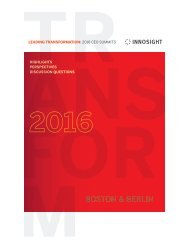TECHNOLOGY AT WORK
1Oclobi
1Oclobi
You also want an ePaper? Increase the reach of your titles
YUMPU automatically turns print PDFs into web optimized ePapers that Google loves.
February 2015<br />
Citi GPS: Global Perspectives & Solutions<br />
87<br />
Money to fund the gap can be generated by<br />
raising top marginal income tax rates,<br />
introducing wealth taxes or taxing goods and<br />
services used primarily by the wealthy<br />
But in times of high (and often still-rising) public debt, an appropriate follow-up<br />
question would be where the resources can be found to fund such additional<br />
spending? The answer to this question is not obvious. This is despite the fact that in<br />
principle there are several fairly obvious candidates. Our analysis has shown that<br />
there are, of course, beneficiaries of the changes we describe. Some of the<br />
potential options to generate the money to fund additional spending could come<br />
from raising taxes on the better-off. In principle, this could happen by raising top<br />
marginal income tax rates, increasing capital income tax rates, raising corporate<br />
income taxes, introducing some form of wealth taxes or taxing goods or services<br />
that are primary consumed by the wealthy more heavily. 141<br />
Such changes in taxation would seem sensible to us, but they would also be a<br />
reversal of the trends of the last few decades. The OECD notes that top statutory<br />
personal income tax rates have fallen significantly in each of the three decades<br />
between 1980 and 2010. 142 In 2010, the OECD average top statutory personal<br />
income tax rate was 41.7%. In 1981, it was 65.7%. Corporate income taxes have<br />
also fallen in recent decades, from 49% in 1981 to 32.5% in 2013.<br />
Piketty famously called for global wealth<br />
taxes in 2014<br />
Wealth taxes could be a solution but they<br />
are difficult to design, costly to administer<br />
and relatively easy to evade<br />
However, some of these trends may already be reversing. A number of countries<br />
already increased their top personal income tax rates in recent years. There is no<br />
sign of headline corporate income tax rates rising systematically across countries.<br />
But significant efforts are under way to close loopholes in the current fiscal<br />
arrangements for corporates, to make life harder for tax havens and to tackle tax<br />
evasion and avoidance more effectively.<br />
Could wealth taxes be the solution? Thomas Piketty made headlines in 2014 when<br />
he famously called for global wealth taxes as one of the main policy responses to<br />
rising (income and wealth) inequality. Piketty called for a tax of 1% on wealth of<br />
between €1-€5 million, 2% on wealth of €2-€5 million (and a much higher tax on<br />
even larger fortunes), and even the IMF has noted that a wealth tax may be<br />
appropriate in some circumstances. Yet outside of extreme circumstances there<br />
have been few (and usually only timid) attempts to increase the taxation of financial<br />
or real property in recent years (and they are quite rare in history). Similarly, the<br />
taxation of capital income has become increasingly prominent in policy discussions<br />
and speeches, notably the special treatment offered to particular types of capital<br />
income (such as for ‘carried interest’ of private equity owners). In his recent State of<br />
the Union address, US President Obama once more called for increases in capital<br />
income taxes and for abolishing some of these privileges. Yet we have seen very<br />
little in the way of an effective increase in the taxation of capital income anywhere.<br />
One of the reasons why wealth taxes have not been raised more widely is that they<br />
are difficult to design, costly to administer and often relatively easy to evade. For<br />
ad-hoc wealth taxes, the risk is that households would fear that such taxes could be<br />
imposed again in the future. For financial assets, a major risk is that the capital will<br />
simply find a home elsewhere — a growing issue in a world of global financial<br />
mobility and still-increasing financial interdependence. Wealth taxes would therefore<br />
be much more likely to be effective if they were imposed globally (as Piketty<br />
argues). The same applies for corporate income and capital income taxation, but we<br />
see little scope for such an initiative in a world where global leadership is rare in any<br />
area, not least against what would likely be fierce lobbying.<br />
141 Another direction would be to reduce other government expenditures. Given<br />
historically high ratios of government expenditure to GDP in many countries, this route<br />
strikes us as eminently sensible, but is outside the scope of this section.<br />
142 See OECD (2011), “Taxing Wages”<br />
© 2015 Citigroup










